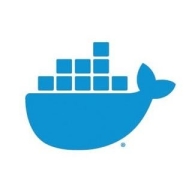

GitGuardian and Docker are key players in software tool categories, excelling in security and containerization respectively. GitGuardian has an edge in security-focused features, while Docker’s strength lies in containerization and integration.
Features: GitGuardian focuses on internal monitoring and secret detection, offering features such as "Dev in the loop" for developer engagement and quick remediation. It integrates effectively with GitHub and developer tools. Docker's standout features include containerization capabilities that provide a flexible environment for deploying applications, multi-environment testing, and seamless integration with Kubernetes for scalability.
Room for Improvement: GitGuardian could benefit from more customization options for industry-specific identifiers and better integration with tools like Splunk. Docker needs improved documentation and user interface, along with enhanced stability and better command line interface to streamline use.
Ease of Deployment and Customer Service: GitGuardian offers on-premises and cloud deployments with highly rated customer service, often praised for responsive support. Docker also supports a variety of cloud environments, although it relies more on community support, with its open-source model affecting customer service expectations.
Pricing and ROI: GitGuardian is considered somewhat costly, particularly for large teams, but delivers strong ROI by reducing security risks and manual code review time. Docker offers an open-source model with a premium enterprise version, presenting a more cost-effective option but lacking GitGuardian's specialized security features.
I can do containerization and share it with every computer, making it work for everyone.
I can certainly say that we have saved significant time and resources in terms of people and automation.
The majority of our incidents for critical detectors and important secret types are remediated automatically or proactively by developers through GitGuardian's notification system, without security team involvement.
From what I gather, customer support is great; they are quick and always available to support or help.
It effectively helps us with credentials security and has been performing satisfactorily.
I would rate their technical support a nine out of ten.
I would rate the technical support as excellent.
Previously, only one or two applications could run on a server, but now it can handle hundreds of applications, scaling up or down as needed.
A realistic metric I observe is that I can scale services from two to over 20 containers without code changes.
In terms of scalability, I would rate it around a ten out of ten, as it handles all the repositories and commit activity we have.
I would rate it a ten out of ten for scalability.
Currently, what GitGuardian Platform is doing works effectively.
Docker has been very stable in my environment, especially once best practices and proper organization were in place.
We set up a lot of the repository, so GitGuardian is a required check.
The SaaS platform has experienced two significant moments of downtime or instability in the last six months, requiring notices and retrospectives.
I would rate the stability of the GitGuardian Platform as excellent with no downtimes.
Docker is a time-tested, proven solution with industry-wide applications.
Windows containers are heavier and slower than Linux containers.
In terms of communication between services, perhaps the configuration within networks between containers could be improved.
Another thing that would be good to see is some more metrics on the usage of the GitGuardian pre-push hooks.
The self-healing activity by developers isn't reflected in the analytics, requiring us to collect this data ourselves.
We are looking for better metrics and audit data, wanting more features such as knowing which users are creating the most secrets or committing the most secrets, what repository, what directory, and who is not checking in secrets.
Docker Desktop is free for individual developers and small teams, but a paid subscription is required for large enterprises.
I consider Docker's pricing to be affordable.
Overall, the secret detection sector is expensive, but we are happy with the value we get.
It's fairly priced, as it performs a lot of analysis and is a valuable tool.
It allows the software to run on various machines without compatibility issues, saving a lot of time.
Good security capabilities are included as well, providing image scanning, non-root containers, and minimal base images that reduce the attack surface.
The most valuable feature is the simple containerization.
One of the best features of the solution is the ability to use pre-push hooks.
A high number of our exposures are remediated by developers before security needs to step in, as the self-healing playbook process engages them automatically.
GitGuardian Platform performs the capability to detect secrets in real time exceptionally, as it activates from the commit and can detect it immediately.
| Product | Market Share (%) |
|---|---|
| Docker | 5.0% |
| GitGuardian Platform | 2.9% |
| Other | 92.1% |

| Company Size | Count |
|---|---|
| Small Business | 22 |
| Midsize Enterprise | 4 |
| Large Enterprise | 35 |
| Company Size | Count |
|---|---|
| Small Business | 10 |
| Midsize Enterprise | 9 |
| Large Enterprise | 13 |
Docker provides a robust containerization platform, enabling identical environments across machines. With features like portability, fast deployment, and minimal resource consumption, Docker supports development, facilitating multitier architectures and integrating seamlessly with Kubernetes.
Docker offers an advanced containerization solution that enhances application management through automation and security measures. By isolating environments and managing dependencies, Docker supports platforms for scalable application development. Its integration with orchestration tools like Kubernetes and independence from host operating systems enable developers to create lightweight applications effectively. Although known for its cost efficiency and flexibility, Docker could improve in areas such as stability, command-line usability, and Windows performance integration. Users also point out the need for enhanced documentation, simplified management tools, and better persistence storage options, along with stronger marketing and easier user adoption.
What important features does Docker provide?Industries leverage Docker for application packaging, deploying microservices, and CI/CD processes. It supports DevOps, enhances backend service management, and enables resource-efficient development environments. Docker's compatibility with tools such as Jenkins ensures seamless integration and orchestration in modern IT workflows.
GitGuardian is a comprehensive platform focused on enhancing Non-Human Identity security by integrating Secrets Security and Secrets Observability to detect and manage secrets across development environments.
As cybersecurity threats increasingly target NHIs like service accounts and applications, GitGuardian offers a robust solution by supporting over 450 types of secrets and deploying honeytokens for additional defense. Trusted by leading organizations and developers, its monitoring and quick alert system enable effective detection and management of sensitive data, strengthening operational security across platforms.
What are the key features of GitGuardian?In the tech industry, GitGuardian is employed to safeguard APIs and sensitive credentials across code repositories like GitHub. Companies benefit from instant alerts and integrations with tools like Slack, effectively managing risks and enhancing security policies. While popular in sectors dependent on development agility, there is room for further improvement in customization and integration to meet specific industry needs.
We monitor all Software Supply Chain Security reviews to prevent fraudulent reviews and keep review quality high. We do not post reviews by company employees or direct competitors. We validate each review for authenticity via cross-reference with LinkedIn, and personal follow-up with the reviewer when necessary.